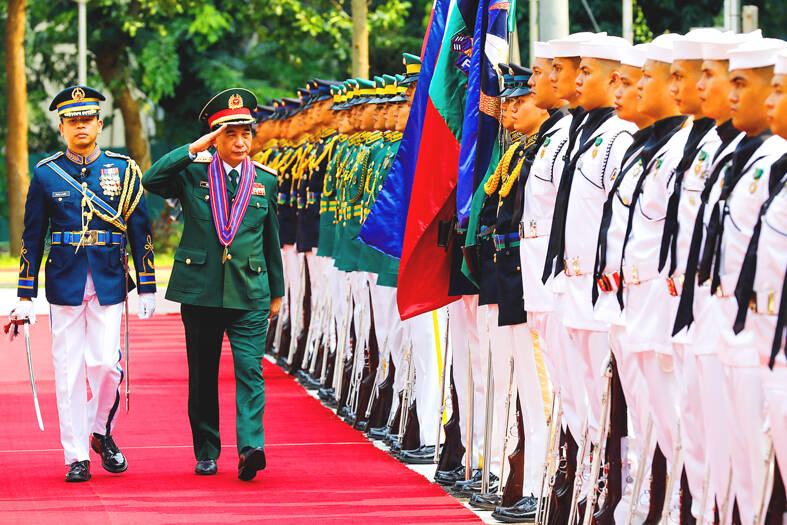The Philippines and Vietnam yesterday agreed to advance defense and military relations, including deeper collaboration on maritime security, in a significant step by two countries long at odds with Beijing over its actions in the South China Sea.
Vietnamese Minister of Defense Phan Van Giang was in Manila for talks with his Philippine counterpart, Gilberto Teodoro, his first such visit, and paid a courtesy call earlier in the day to Philippine President Ferdinand Marcos Jr.
“The ministers expressed their unwavering commitment to deepen defense and military cooperation through continued interaction and engagements at all levels,” the Philippine Department of National Defense said in a statement.

Photo: EPA-EFE
Giang said the two countries agreed to maintain peace and stability in the South China Sea and resolve disputes in line peacefully and in line with international law.
Their meeting comes at a time of simmering tension in the South China Sea and international concern about the possibility of an escalation, with China and US defense ally the Philippines sparring almost every week in a row that has raged for more than a year.
Vietnam has a tricky balancing act of opposing actions by China that it deems infringements on its sovereignty, while needing to maintain close relations with a giant neighbor and major trade partner, forged over decades by their ruling communist parties.
Teodoro said it was important that the ASEAN be central to ensuring peace and stability and freedom of navigation and aviation in the South China Sea.
“We talked about making more concrete and effective steps of working together and with our ASEAN partners, to ensure the continuity of these desires of all ASEAN peoples through concrete cooperation and interaction, underscoring the primacy of international law,” he said.
Despite their overlapping claims in the Spratly Islands in the South China Sea, where Vietnam and the Philippines each occupies atolls and reefs, both countries have expressed desire to work together and tackle disputes.
The two nations’ coast guards earlier this month held their first-ever joint exercises in Manila, simulating fire-fighting drills and search-and-rescue exercises.

Seven people sustained mostly minor injuries in an airplane fire in South Korea, authorities said yesterday, with local media suggesting the blaze might have been caused by a portable battery stored in the overhead bin. The Air Busan plane, an Airbus A321, was set to fly to Hong Kong from Gimhae International Airport in southeastern Busan, but caught fire in the rear section on Tuesday night, the South Korean Ministry of Land, Infrastructure and Transport said. A total of 169 passengers and seven flight attendants and staff were evacuated down inflatable slides, it said. Authorities initially reported three injuries, but revised the number

‘BALD-FACED LIE’: The woman is accused of administering non-prescribed drugs to the one-year-old and filmed the toddler’s distress to solicit donations online A social media influencer accused of filming the torture of her baby to gain money allegedly manufactured symptoms causing the toddler to have brain surgery, a magistrate has heard. The 34-year-old Queensland woman is charged with torturing an infant and posting videos of the little girl online to build a social media following and solicit donations. A decision on her bail application in a Brisbane court was yesterday postponed after the magistrate opted to take more time before making a decision in an effort “not to be overwhelmed” by the nature of allegations “so offensive to right-thinking people.” The Sunshine Coast woman —

BORDER SERVICES: With the US-funded International Rescue Committee telling clinics to shut by tomorrow, Burmese refugees face sudden discharge from Thai hospitals Healthcare centers serving tens of thousands of refugees on the Thai-Myanmar border have been ordered shut after US President Donald Trump froze most foreign aid last week, forcing Thai officials to transport the sickest patients to other facilities. The International Rescue Committee (IRC), which funds the clinics with US support, told the facilities to shut by tomorrow, a local official and two camp committee members said. The IRC did not respond to a request for comment. Trump last week paused development assistance from the US Agency for International Development for 90 days to assess compatibility with his “America First” policy. The freeze has thrown
TESTING BAN: Satellite photos show a facility in the Chinese city of Mianyang that could aid nuclear weapons design and power generation, a US researcher said China appears to be building a large laser-ignited fusion research center in the southwestern city of Mianyang, experts at two analytical organizations said, a development that could aid nuclear weapons design and work exploring power generation. Satellite photos show four outlying “arms” that would house laser bays, and a central experiment bay that would hold a target chamber containing hydrogen isotopes the powerful lasers would fuse together, producing energy, said Decker Eveleth, a researcher at US-based independent research organization CNA Corp. It is a similar layout to the US$3.5 billion US National Ignition Facility (NIF) in northern California, which in 2022 generated